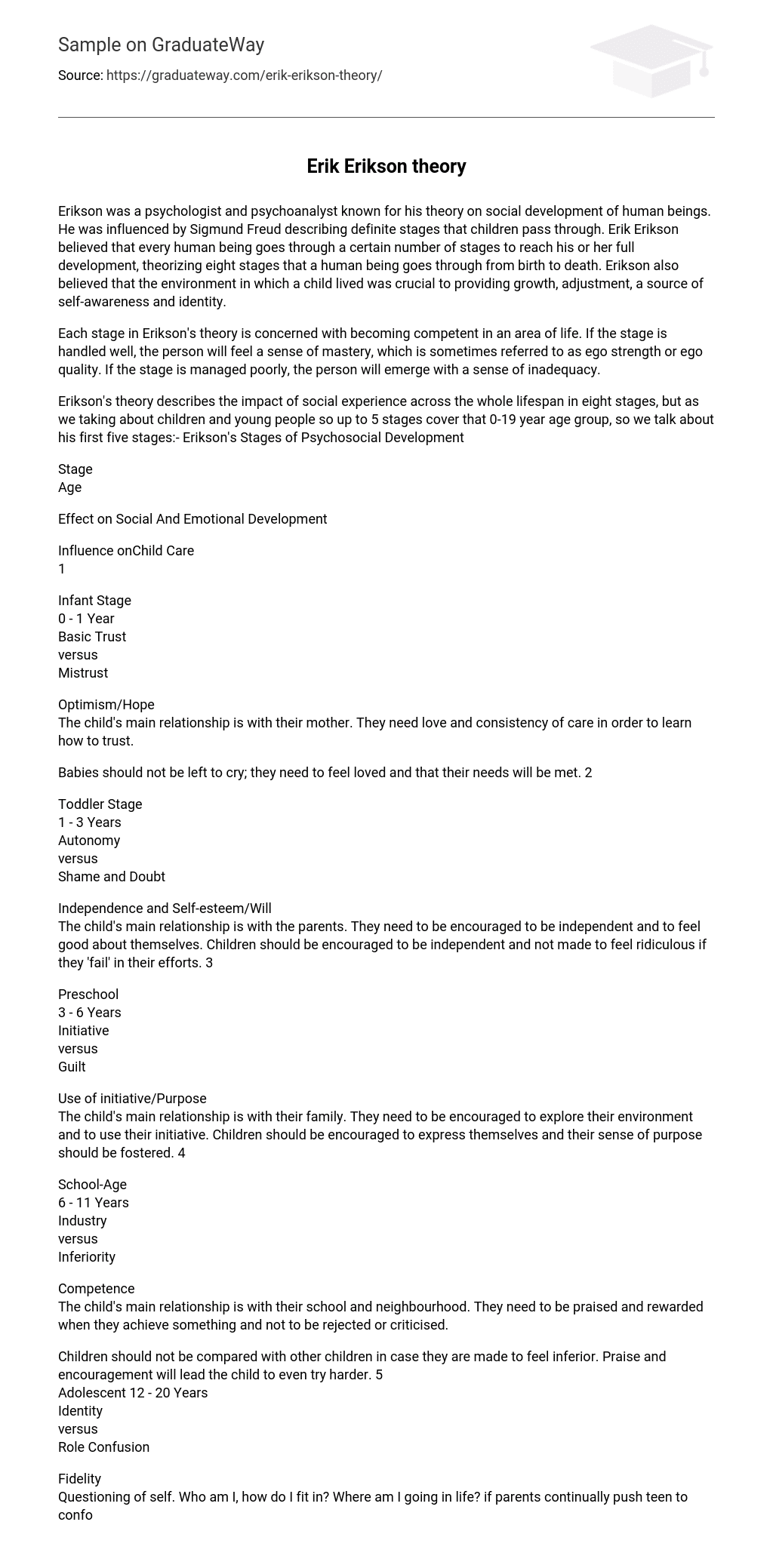Erikson was a psychologist and psychoanalyst known for his theory on social development of human beings. He was influenced by Sigmund Freud describing definite stages that children pass through. Erik Erikson believed that every human being goes through a certain number of stages to reach his or her full development, theorizing eight stages that a human being goes through from birth to death. Erikson also believed that the environment in which a child lived was crucial to providing growth, adjustment, a source of self-awareness and identity.
Each stage in Erikson’s theory is concerned with becoming competent in an area of life. If the stage is handled well, the person will feel a sense of mastery, which is sometimes referred to as ego strength or ego quality. If the stage is managed poorly, the person will emerge with a sense of inadequacy.
Erikson’s theory describes the impact of social experience across the whole lifespan in eight stages, but as we taking about children and young people so up to 5 stages cover that 0-19 year age group, so we talk about his first five stages:- Erikson’s Stages of Psychosocial Development
Stage
Age
Effect on Social And Emotional Development
Influence onChild Care
1
Infant Stage
0 – 1 Year
Basic Trust
versus
Mistrust
Optimism/Hope
The child’s main relationship is with their mother. They need love and consistency of care in order to learn how to trust.
Babies should not be left to cry; they need to feel loved and that their needs will be met. 2
Toddler Stage
1 – 3 Years
Autonomy
versus
Shame and Doubt
Independence and Self-esteem/Will
The child’s main relationship is with the parents. They need to be encouraged to be independent and to feel good about themselves. Children should be encouraged to be independent and not made to feel ridiculous if they ‘fail’ in their efforts. 3
Preschool
3 – 6 Years
Initiative
versus
Guilt
Use of initiative/Purpose
The child’s main relationship is with their family. They need to be encouraged to explore their environment and to use their initiative. Children should be encouraged to express themselves and their sense of purpose should be fostered. 4
School-Age
6 – 11 Years
Industry
versus
Inferiority
Competence
The child’s main relationship is with their school and neighbourhood. They need to be praised and rewarded when they achieve something and not to be rejected or criticised.
Children should not be compared with other children in case they are made to feel inferior. Praise and encouragement will lead the child to even try harder. 5
Adolescent 12 – 20 Years
Identity
versus
Role Confusion
Fidelity
Questioning of self. Who am I, how do I fit in? Where am I going in life? if parents continually push teen to conform to their views, the teen will face identity confusion. Parents should allow the child to explore and conclude their own identity.
Stage
Basic Conflict
Important Events
Outcome
Infancy (birth to 18 months)
Trust vs. Mistrust
Feeding
Children develop a sense of trust when caregivers provide reliabilty, care, and affection. A lack of this will lead to mistrust. Early Childhood (2 to 3 years)
Autonomy vs. Shame and Doubt
Toilet Training
Children need to develop a sense of personal control over physical skills and a sense of independence. Success leads to feelings of autonomy, failure results in feelings of shame and doubt. Preschool (3 to 5 years)
Initiative vs. Guilt
Exploration
Children need to begin asserting control and power over the environment. Success in this stage leads to a sense of purpose. Children who try to exert too much power experience disapproval, resulting in a sense of guilt. School Age (6 to 11 years)
Industry vs. Inferiority
School
Children need to cope with new social and academic demands. Success leads to a sense of competence, while failure results in feelings of inferiority. Adolescence (12 to 19 years)
Identity vs. Role Confusion
Social Relationships
Teens need to develop a sense of self and personal identity. Success leads to an ability to stay true to yourself, while failure leads to role confusion and a weak sense of self. Young Adulthood (20 to 40 years)
Intimacy vs. Isolation
Relationships
Young adults need to form intimate, loving relationships with other people. Success leads to strong relationships, while failure results in loneliness and isolation. Middle Adulthood (41 to 65 years)
Generativity vs. Stagnation
Work and Parenthood
Adults need to create or nurture things that will outlast them, often by having children or creating a positive change that benefits other people. Success leads to feelings of usefulness and accomplishment, while failure results in shallow involvement in the world. Maturity(65 to death)
Ego Integrity vs. Despair
Reflection on Life
Older adults need to look back on life and feel a sense of fulfillment. Success at this stage leads to feelings of wisdom, while failure results in regret, bitterness, and despair.





